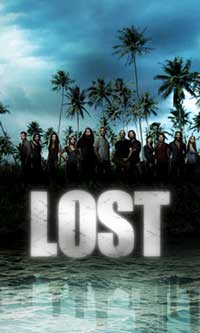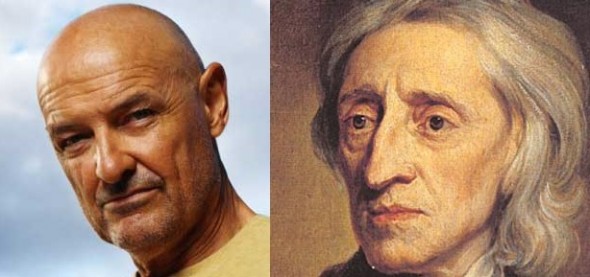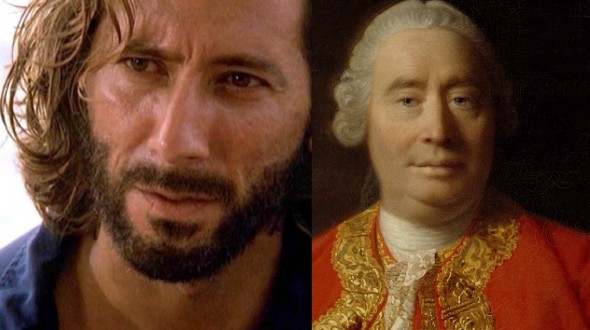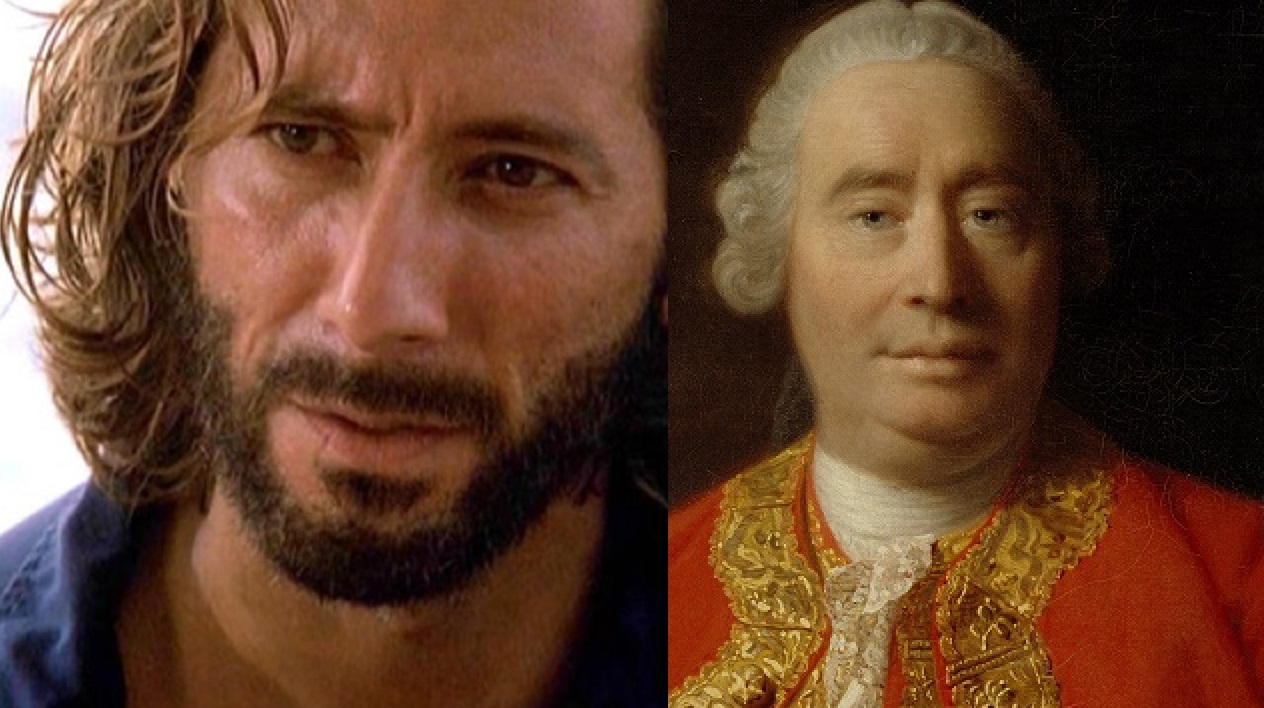
It was ten entire years ago that the first episode of Lost aired on ABC; it was the most expensive pilot episode of a TV series ever, and it also had record-setting viewership, drawing 37.3 million eyeballs to the screen for that premiere hour (assuming an average of two eyeballs per viewer). Six years, 121 episodes, one Hollywood writers strike and negative five million viewers later, Lost had changed the face of American entertainment, proving that viewers were willing and indeed eager to accept smart, baffling, and above all heavily serialized drama on network television.
It also proved that people hate uncertainty. Lost opened with a planeful of diverse people crashing on a mysterious island somewhere in the South Pacific, and only got more mysterious from there – for every question answered, two or three new ones arose. By the final episode, the show had grown so swollen with mythology and intrigue and ghosts and time travel that a great proportion of its remaining audience didn’t know what was what, and it’s even come to my attention that some people still believe that everybody was dead all along. (Just for the record: They weren’t. That’s not what happened. Like, at all. If you think that, you are wrong. And if that’s why you didn’t like the finale, watch it again and pay attention this time.)
But the number one complaint about the series finale of Lost, from those not insignificant viewers who hated it, was this: “They didn’t explain! They didn’t answer anything!” Which, first of all, is not true. Plenty of the questions and mysteries raised throughout the course of the series were definitely answered – just not explicitly enough for some people’s tastes. Lost required the viewer to do a lot of the mental work themselves. And for the show’s most hardcore fans, mental work they did.
But exhaustive research and hunting for clues isn’t what everyone is looking for in their primetime network dramas. For some of the answers that were explicitly revealed in the finale, the stated onscreen explanation felt condescending, coming dangerously close to insulting the viewer’s intelligence (like the nature of the whispers).

Locke and Locke
Beyond even that, protesting the absence of sufficient explanations is nothing less than to completely miss the entire point of Lost. Of the many philosophical themes of which Lost was concerned, the central one seemed to be Reason (represented by the character of Jack Shephard) versus Faith (represented by the character of John Locke). Ultimately, faith seems to win out (Locke dies, but Jack ends up acknowledging that he, Locke, had been right and Jack wrong). The mediating factor between the two apparent extremes, though, is precisely uncertainty, represented by the mediating character and fan favourite Desmond.
Desmond Hume, a Scotsman who had been shipwrecked on the island for several years before the plane crash that occurred in the pilot episode, was at ground zero of the implosion of the underground bunker built by the Dharma Initiative in the 1970s designed to safely discharge the mysterious electromagnetic pulses that resulted from Dharma’s excavation and experimentation on the island. If you haven’t seen the show, that probably made no sense to you at all. Anyway, the implosion left Desmond with the ability (or the curse, really) to move his consciousness back and forth through time – meaning that he was privy to vital information as well as capable of, in principle, delivering messages that could change the outcome of events. In the world of Lost, this made Desmond unique, in that the rules of time travel generally don’t allow for altering the past, but it’s postulated that Desmond could be the exception to this – and the Losties attempt to use this possibility to their advantage.
In addition, and in actuality more significant to the outcome of the show’s events, because of his exposure to the electromagnetic pulse, Desmond became the only person capable of surviving at the Heart of the Island, making him the character whose actions at the end of the series had the greatest direct impact on the story’s outcome.
This was definitely deliberate. Despite one of the other criticisms of Lost (that it could mistake mere references for symbolism), at least in Desmond’s case the character’s name was a clear sign pointing to his position and meaning in the story. His full name being Desmond David Hume.
The original David Hume was a Scottish philosopher who lived in the mid-18th Century. Like the viewers of Lost, Hume was concerned with issues of knowledge – how we come to hold our beliefs and whether they can be rationally justified. On Lostpedia, there are always separate sections for facts (things that we know because they were shown or stated directly onscreen) and theories (fans’ speculations based on incomplete information or implied connections) – but Hume gave us cause to doubt that any of our so-called knowledge could be rationally justified at all.
All knowledge, Hume tells us, comes from our perceptions of the outside world as delivered to us by our senses. But we are only immediately aware of the contents of our own minds. That is, the information about the world that our senses give us only transforms into knowledge by the processes of cognition that happen inside us – in other words, our knowledge of the world is never direct but always mediated. So here’s the problem: if our knowledge can’t necessarily be justified simply by virtue of sensory impressions coming at us from the world, how can it be justified? How do our minds manufacture knowledge out of perceptions? How is it possible to know that it’s possible to know anything?
Hume says: actually, it’s not. Here’s why.

Hume and Hume
Human reason – which is how we judge true things from false things, how we make sense of the world around us, and on which we rely to make choices about how to behave (the Jack Shephard side of the Jack/Locke equation) – relies extensively on induction. This is the process by which we take information about observed behaviour in the past and project it into the future. One example is our “knowledge” that the sun will rise tomorrow. How do we actually know that? Because every single day that we’ve experienced in the past, the sun has always risen. By the principle of induction, the logical rule that the laws by which the universe functions are consistent and so the future is likely to resemble the past, we can feel confident that tomorrow will be similar to today and yesterday and every other day, and that the sun will rise. Similarly, we know that if we drop an object it will fall – or that, say, if a plane’s engines fail somewhere over the Southern Pacific, it will crash. But we don’t know these things by direct observation, only by judgment: we have observed that the sun has always risen and objects have always fallen, but not because we have some intimate understanding of the Earth’s rotation relative to the sun or the inner workings of gravity – and certainly not because we’ve already seen the future and so we know from personal experience (with the exception, of course, of Desmond). We “know” what will happen only by induction. Induction is the ultimate level of the philosophy of science, where experimentation leading to consistent results gives us the means to predict that if we do X then Y will necessarily follow.
For the survivors on the island, though, this seems to be one of the many things that have completely broken down. We all know that paralyzed men won’t start miraculously walking, that dead people don’t come back, that polar bears don’t live on tropical islands. But we know these only things because we’ve never observed them happening before. Jack, the surgeon and man of science, starts out certain that all the mysterious occurrences on the island will end up having a rational explanation. Locke, on the other hand, the man of faith, is convinced that something miraculous, something supernatural is going on; in other words, something that flouts our reliance on reason as a means of coming to knowledge because it relies on rules other than those that govern the universe by which we’re used to living.
Jack’s and Locke’s differing attitudes come into conflict directly because of Desmond: when they (and we) meet him, he’s been living in an underground bunker entering a series of numbers into a computer every 108 minutes for the past three years. Desmond is convinced that failing to do this will lead to something catastrophic – and in all the time that he’s been pushing the button, nothing catastrophic had so far occurred. That part checks out. But Jack becomes convinced that the whole thing is a charade – a psychological experiment leftover from the Dharma Initiative to test how subjects would react to such a situation. Desmond only trusts that what he’s told is true, but the epistemological question of how do you know? is central to determining the justification for Desmond’s (or anyone’s) actions.
Turns out that failing to enter the numbers does have some devastating consequences, but the inhabitants of the island (and the viewers of the show) only discover that by observation – and by that point it’s too late, it’s an unrepeatable circumstance that fails to produce any useful information that could be used in the future. We know what happened, but that knowledge of the past doesn’t help us if we will never be in that situation again. Inductive reasoning is short-circuited by one-time events like this, in much the same way that it’s short circuited by the ability to travel back and forth in time. While physical time travel in the Lost universe doesn’t seem to make changing history possible, Desmond’s method of moving his consciousness through time is postulated to work differently – but why? One set of laws ought to work for one single universe, shouldn’t it?
Much later on in Lost we begin to learn that the rules are not so solid as we’ve always thought, and might very well just be up to the whims and values of whichever power happens to be in charge at the moment. Which cuts to the heart of Hume’s problem of induction: how do we know that induction is a good way to gain knowledge? The only real reason we have to believe that the future will resemble the past is that the future has always resembled the past. Meaning that the justification for the efficacy of inductive reasoning itself relies on inductive reasoning. Inductive reasoning is circular. And thus the very basis of reason is itself inherently and necessarily unreasonable.

Shepherd and Shepherd
We like mysteries. That’s one of the reasons that Lost was so popular from its very beginning. Along with great writing and acting, and above and beyond its intriguing premise, it provided us with a planeload of questions. What we don’t like – or what much fewer of us like, anyway – is ambiguity. It’s no coincidence that detective stories and police procedurals tend to end with the revelation of the murderer’s identity and motivations, and all the gory details of the crime. We simply want to know.
But one of the most important questions at the centre of Lost was precisely: how can we know? How can we ever really know? And this question was answered in most appropriate possible way – by not answering it. Because the answer is that we can’t. Lost gave us all the answers that we needed in the end, because its basic point is that we can’t ever have all the answers. Not because someone is withholding them from us. Not because the creators of the show had no plan and no answers to give (which was also an accusation not infrequently hurled). But because it’s literally impossible ever to have all the answers. Every answer is just another question, and that’s not a failure of the show but an epistemological statement about the nature of reality.
When Desmond Hume travels to the Heart of the Island, he learns a vital secret. Although he can’t possibly know what’s about to happen, he still acts and even succeeds. The rules, as far as anyone can tell, might actually be changing from moment to moment. There’s no way to prove that they don’t. That we’re constrained to behave as if things are predictable and not just random – as if there’s a plan, a purpose, some constant at the centre of things – is inescapably, whether we like it or not, an act of faith.

Well, I thought I payed attention, but it seemed to me they were all dead from the start, but we have to of course, according ourself about the term of ” being dead”. Jack said from the very start ” we all died in this crash, we earned a second chance” and the time-travel issue can be perceived as reincarnations cycles that lead to the final, which is acceptance : accepting to leave “things” (good, or dear to our hearts, and bad as well). The time-travelling moments gave us two perspectives, sometimes in the proper context you can fully realize yourself at your best (Sawyer as chief-security) and sometimes even is everything good, there’s still something that doesn’t work (the whom who have escaped the island) and you have to find out what it is (sometimes it is you, and sometimes it is not). The parable works as life is better for whom stayed onto the island, cause in the island, your dream come true (see the polar bear out of a child’ comic-book)which is another parable itself, close from the Stanislas Lem’ novel and his film adaptation by Andreï Tarkovsky, ” Solaris”, a gateaway for an entire other perception of the world as we know it, about litterally ” the soul of the world” and actually, Lost is replaying the whole polemic between Solaris and 2001, A Space Odyssey at their times.
I guess I just was more interested in the Dharma Initiative itself and what they were investigating, and was frankly bored by the whole Jack vs Locke bit. That’s why I was excited by the whole time-travel subplot, but didn’t really explain things. The Dharma Initiative was conducting research. What kind of research, and why? At various points of time we get indications that some of it was psychological, some of it physics, and some of it even linguistic (chalkboards in the background suggest they were studying Egyptian hieroglyphics for some odd reason, plus the whole point of having everyone learn spoken Latin). Whether or not the Island can be explained by natural causes doesn’t change the fact that presumably the whole point of having a research institute there implies that they *thought* it did. It could have been a much better show if they hadn’t thrown that all away for a non-sequitur story about two supernatural brothers in the last season.
The problem was not that they didn’t explain things. The problem was that they the writers were mystifiers, they keep adding new absurd things and suggesting, implying a meaning that was not there. I don’t care if there isn’t a logical explanation – It’s the constant implying that there will be one (a lie) the thing that bothers me. If I see “Beasts of the Southern Wild” (just an example) I don’t need to know or understand everything, but the story and the film is aesthetically pleasant. But if I read a novel by Agatha Christie I want to know who the murder is. “Lost” was more close to the latter. And it was just bad writing. And it’s intentionally bad – they sacrificed the pace that the story demanded to have more seasons and sell more. Now, when I look backwards I really don’t like even the first seasons (which I enjoyed at the time).